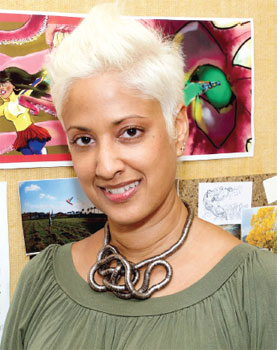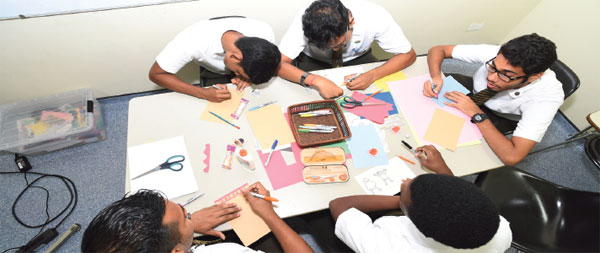

 One role of Faculty Research Day (FRD) is public outreach, showcasing cutting-edge research and how faculty students learn about health, professionalism and developing a moral compass. Allison Shepherd of the Faculty of Medical Sciences shares her role. One role of Faculty Research Day (FRD) is public outreach, showcasing cutting-edge research and how faculty students learn about health, professionalism and developing a moral compass. Allison Shepherd of the Faculty of Medical Sciences shares her role.
We pushed thumbtacks into the display boards, pinning into place the four tenets of our communication thrust: poetry, film, community service and public awareness. Faculty Research Day at Medical Sciences allowed us to engage with Sixth Formers and showcase the innovative projects and passions of our staff and students.
Our Professionalism, Ethics and Communication in Health (PECH) courses are offered in the first three years, and focus on molding medical professionals who will treat their clients with kindness, compassion, and empathy. It’s more difficult than it sounds.
It’s a rough, uncertain world, and conditions are never ideal. Working in hospitals, clinics, pharmacies or anywhere the ill come for succor can be distressing, and can bring out the worst in a person. This additional component of the 2017 FRD highlighted ways in which the Faculty is helping to better understand the needs and attitudes of T&T society.
This ideal has influenced the way we expose students to concepts of ethics and communication with the expectation that high level critical thinking is developed and infused with a deeper understanding of their clients. Narrative medicine has proved successful in creating a professional engaged and invested in community. Whether this can be sustained throughout a long and diverse career is something we’re keen to explore.
Our communication room had a poetry corner where visitors composed poems on anthropomorphised diseases, and with teenage hearts pinned firmly on their sleeves. The results were poignant with a dark twist: smoking addiction, anorexia and depression over lovers their parents hate and whom they cannot relinquish.
Public awareness campaign postcards were crafted with messages that the young obsess about: safe sex, obesity, and good mental health. These are important insights from young minds as to their perceptions of health and approaches to correction that resonate with them.
Outside our room, there were more than 30 presentations to audiences in the form of research posters, covering an array of clinical issues including COPD, dementia, usage of painkillers and various types of surgery. There was attitudinal research of the male partner’s presence during a baby’s delivery, dietary non-compliance, knowledge of ZIKA and self-care among those with diabetes.
This showcase of the latest developments is a centrepiece of the day, but is far from its only draw.
Back in the communications room, also on display were films produced by second year MBBS students on confidentiality that played on a loop in another part of the room and had most entranced by the mature execution of the topic both in production values and content.
As part of our thrust to develop medical professionals invested in their communities, students must engage with the underserved. This has allowed them to venture into villages and neighbourhoods, perhaps where many had never been before, to work with children in orphanages; older people in assisted living; developing apps to navigate the hospital and cut down on waiting times or re-vamping pain charts specific to our culture and language.
Clinical photography by our resident photographer, Dexter Superville, was projected as an installation to show both technical aspects to his work, and how an approach to considering the artistic merits might yield important clinical observations: seeing an image in an unfamiliar setting captivates and entrances, and that is an important step in re-evaluating how we engage with health.

|





